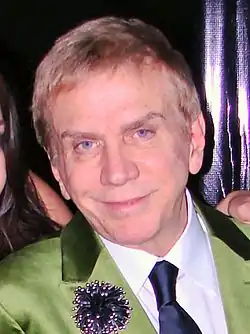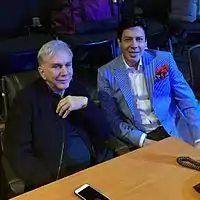Osmel Sousa
Osmel Ricardo Sousa Mansilla[1] (born 26 September 1946) is a Cuban-Venezuelan beauty pageant entrepreneur, gurú[2] and the former president of the Miss Venezuela and Mister Venezuela Organization.
Osmel Sousa The Caesar of Beauty | |
|---|---|
 The "Impresario" of Venezuela | |
| Born | Osmel Ricardo Sousa Mansilla 26 September 1946 Cienfuegos, Cuba |
| Other names | Impresario of Beauty Pageants |
| Occupation | National director of Venezuela 1981 – 2018 (retired) |
Prominently known for his excellence in both pageantry and advertising, Sousa has been called "The Tsar of Beauty" or Impresario for his significant role in producing the large number of beauty titles for Venezuela.[3][4]
On 8 February 2018, Sousa announced his public intention to retire from the position and was ultimately succeeded by Gabriela Isler as national director for Venezuela.
Early life
Osmel Sousa was born in Rodas, a town in the province of Cienfuegos in Cuba. When he was thirteen, his family sent him to live with his grandmother in Maracaibo, Venezuela.[5] After high school he studied with Horacio Peterson's acting company with Lupita Ferrer, Miguel Ángel Landa and Luis Abreu, but quickly realized that he was not cut out to be an actor. He then briefly held jobs as an advertising draftsman and art designer for the two large television networks in Venezuela, the state owned VTV and the cable network RCTV.[5]
Miss Venezuela

In 1969, Osmel Sousa went to work for the publicity company in charge of organizing the annual Miss Venezuela contest. He was assigned to work with the Venezuelan Committee of Beauty. Sousa continued working with that committee when, in 1970, Ignacio Font Coll reconstituted it as the OPPA Advertising Agency, which in turn was the predecessor of the actual Miss Venezuela Organization.[6]
In the 1970s, Osmel Sousa undertook advising selected contestants, many of whom went on to win the Miss Venezuela crown, at the same time he started designing nightgowns for most of the contestants. His first success was María Antonieta Cámpoli, who became Miss Venezuela in 1972,[5] and went on to be 2nd runner-up in the Miss Universe contest.[7]
In October 1981 Ignacio Font Coll died and Osmel Sousa became the president of the Miss Venezuela Organization. During his thirty-year career he has been considered to be the driving force behind the large number of Miss Venezuelas who go on to become Miss World, Miss Universe, Miss International and Miss Earth.
Sousa has been called a Pygmalion, an artist who turns out talented and beautiful young women.[8][9] To date, Venezuela has had seven Miss Universe titleholders, six Miss World winners, eight Miss International crowns, and two wins in Miss Earth, becoming the most successful pageant powerhouse in history.
In a 1997 interview with Latina magazine, Sousa described his bias against contestants with African features with the following controversial statement:
"Black Venezuelan women are not very beautiful...Their noses are too big—no one could operate on them! Occasionally, I choose a morenita, but she has to have a white girl's features—just painted dark."[10]
In 2007, Sousa joined with Lupita Jones, a former Miss Universe (1991), and Carlos Calderón, emcee of "El Gordo y La Flaca", in judging Univision's Hispanic beauty contest Nuestra Belleza Latina.[11]
On 6 February 2018, Sousa publicly announced his retirement from the Miss Venezuela organization after forty years of tenure.
Mister Mundo
In 1996 he became the franchise manager for the Mister World for Venezuela, In 1998, she achieved her first success in this contest of male beauty, giving the first title of Mister world to Venezuela, which was won by Sandro Finoglio.
Miss Argentina and Miss Uruguay
At the beginning of July 2019, Sousa announced, through its social networks, that it will assume the direction of the beauty contests of Miss Argentina and Miss Uruguay.
Controversies and legacy
Osmel Sousa has been involved in a number of controversies over the years, with everything from whether the color and style of dress that he picked was appropriate,[12] to whether or not he advised plastic surgery for a particular contestant[13] to the charge that he creates "fashion mannequins".[14] In 1979, Maritza Sayalero was the first Venezuelan contestant to admit that she'd had plastic surgery.[1] Sousa changed the way that the Miss Venezuela contestants achieved success and public attitudes on plastic surgery[1] In Venezuela, and other countries plastic surgery received much more general acceptance and even became fashionable.[15]
In recent years, Sousa has been also involved in several controversies related to same-sex marriage in Venezuela, by saying he's not only against it, but also against child adoption by same sex parents. He also has said in many occasions he was estranged by his parents, and consequently sent to Venezuela when he was only a teenager, and even put him on hormonal treatment to make him "manlier" due to his sexual orientation.[16]
See also
Notes and references
- Batiz, César & Lindarte, Jhon (2015). "Miss Venezuela, la cara bonita de la decadencia" (PDF). Nueva Sociedad (in Spanish) (255 January/February): 145–153. Archived (PDF) from the original on 19 March 2015.
- Ziegler, Ulf Erdmann (2001). "In the Theater of the Dolls – Venezuelan exhibition on the beauty pageant". Art in America. 89 (4): 59. Archived from the original on 23 May 2006.
- Staff (20 October 2013). "Osmel Sousa es Reconocido en Miami (Osmel Sousa is Recognized in Miami)". El Nacional (in Spanish). Caracas, Venezuela. Archived from the original on 31 October 2013.
- Staff (1996). "Beauty? Forget Bangalore: Venezuela's outstanding records in Miss World and Miss Universe contests are the result of Osmel Sousa's Miss Venezuela program". The Economist. 341 (7994): 40. (30 November 1996)
- Rodríguez, Magaly (12 October 2014). "Osmel Sousa: El niño que se convirtió en zar". El Nacional (in Spanish). Caracas, Venezuela. Archived from the original on 6 May 2015.
- "History of Miss Venezuela Organization". Miss Venezuela Organization. Archived from the original on 8 May 2006.
- Miss Universe Coverage 1972 Archived 27 June 2015 at the Wayback Machine
- Lee, Ingrid (1998). "Modern Pygmalion – Tribute to Osmel Sousa". Miss Venezuela Organization. Archived from the original on 11 June 2001.
- Tulio Hernandez, a noted Venezuelan sociologist, was quoted as saying that Osmel Sousa was "the Pygmalion of our national mythology" Rohter, Larry (13 August 2000). "Vanity has a high place in Venezuela" (PDF). Laredo Morning Times. Laredo, Texas. Archived from the original (PDF) on 15 December 2003.
- Fusco, Coco (1997). "Escuela Miss Venezuela". Latina (in Spanish). No. August. pp. 66–71, page 68.
- Staff (4 April 2007). "Univision Announces 12 Finalists to Compete in Nuestra Belleza Latina". Broadcast Room (BN).
- Herrera, Manuel (17 April 2015). "Ex-Miss Venezuela Migbelis Castellanos acusa a Osmel Sousa por su vestido de Miss Universo". La Nación (in Spanish). San José, Costa Rica. Archived from the original on 19 April 2015.
- "Osmel Sousa asegura que María Gabriela Isler no se operó la cara". El Nacional (in Spanish). 26 November 2013. Archived from the original on 27 November 2013.
- Salazar, Armando & Acevedo, Humberto (8 November 2013). "Osmel Sousa responde a New York Times". El Nacional (in Spanish). Archived from the original on 9 November 2013.
- Davis, Allison P. (7 November 2013). "Mannequins With Ever More Insane Proportions". New York Magazine. Archived from the original on 8 November 2013.
- "Archived copy". Archived from the original on 8 December 2015. Retrieved 28 November 2015.CS1 maint: archived copy as title (link)
Further reading
- Misses de Venezuela: reinas que cautivaron a un país : crónicas reportajes y testimonios del concurso Miss Venezuela. Issue 56 of Colección Ares. Serie El nacional cuenta a Venezuela (in Spanish). Caracas, venezuela: Los Libros de el Nacional. 2005. ISBN 978-980-388-206-8.
External links
- "Osmel Sousa: Una Vida Dedicada a la Belleza" (in Spanish). Miss Venezuela official website. 1996. Archived from the original on 7 May 2001.;
- Castillo, Laura Helena. "El Presidente del Miss Venezuela Abre por Primera Vez las Puertas de Su Intimidad: A La Cama Con Osmel (Interview with Osmel Sousa)". El Nacional (in Spanish). Caracas, Venezuela. Archived from the original on 1 October 2005.;
- Sardi, Camila (2005). "Osmel Sousa: a tireless fighter of the feminine beauty (Interview with Osmel Sousa)". Archived from the original on 8 May 2006.;
- "Osmel Sousa" (in Spanish). Miss Venezuela Organization.;
- "Osmel Sousa Responde a Reportaje del New York Times (Osmel Sousa Responds to the New York Times Article)" (in Spanish). Archived from the original on 13 December 2013.